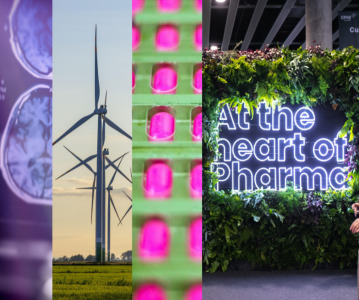5 big pharma companies agree to decarbonise operations in China

Following extensive talks, leading pharmaceutical companies sign an agreement to work with renewable energy companies to decarbonise their manufacturing supply chains in China and switch to renewables.
Renewable energy in pharmaceuticals is considered one of the most important areas to tackle in terms of climate change, and an aspect that pharmaceutical companies have the means and room to improve.
Making a statement move in this direction are five of the biggest global pharmaceutical and healthcare companies: AstraZeneca, Lonza, Novartis, Novo Nordisk, and Roche, who have all signed a renewable power agreement in China. The agreement is an industry first, with such big players setting the bar by agreeing to decarbonise their operations in China.
The companies, four of whom are already members of the Sustainable Markets Initiative Health Systems Task Force, announced their agreement, which is to last at least 3 years, at the World Economic Forum in Davos, Switzerland. The plan sets out to support China on its path to becoming carbon neutral, and aims to unlock 200 GWh of renewable electricity annually from 2024 across Jiangsu, Guangdong, Shanghai, and Beijing. The resulting reduction in emissions will amount to 120,000 tonnes of carbon dioxide equivalent (CO2e).
The agreement comes after talks between the companies preceding COP28, where healthcare and pharma were broadly considered within sustainability initiatives and plans, more so than ever before. This latest agreement also lays the groundwork for other companies, with the option to join the initiative to work together to decarbonise their supply chains in China. Manufacturing supply chains are responsible for more than half of the emissions produced from the pharmaceutical sector, so changing to renewable energy will cut these considerably across the industry.
To facilitate the switch to renewable energy Envision Energy, one of the biggest renewable energy firms in China, will be providing the electricity. The majority of the participating companies are involved in several other sustainability initiatives, and from this have developed further connections to a working group in China involving 16 Chinese companies spanning health, energy, and digital, to reduce the global impact China’s energy consumption has.
The Sustainable Markets Initiative’s Health Systems Task Force continues to work with and encourage further partnerships to deliver more sustainable frameworks and tackle climate change throughout the sector.
Related News
-
News CPHI Podcast Series: The 2023 Retro – what have we learnt from the past year in pharma?
Welcome to the last episode of 2023! Digital Editor Lucy Chard is joined by her teammates in a special retrospective episode to close out the year. Guests Vivian Xie, Editor for CPHI Online and Tara Dougal, Content Director for Pharma, discuss their hi... -
News Pharmaceutical industry supports COP28 health stance in joint statement
As COP28 takes place over this week in Dubai, UAE, several bodies in the pharmaceutical and health industries have come together to announce support of key movements in sustainability in the sector, and to recognise sustainability as a health issue.&nb... -
News CPHI Barcelona 2023 – From the Floor
It's that time of year again - the biggest pharma event of the year comes to Spain this October for CPHI Barcelona 2023. Follow our Editors Vivian Xie and Lucy Chard as they worked their way through the conference, bringing highlights from content ... -
News CPHI Barcelona Annual Report illuminates industry trends for 2024
The CPHI Annual Survey comes into it’s 7th year to report on the predicted trends for 2024. Over 250 pharma executives were asked 35 questions, with their answers informing the industry landscape for the next year, spanning all major pharma marke... -
News CPHI Barcelona Sustainability Partner Interview – Procaps' improvement through innovation
Procaps, developer of pharmaceutical and nutraceutical solutions, medicines, and hospital supplies that reach more than 50 countries in all five continents, has partnered with CPHI Barcelona to support sustainability initiatives, to be highlighted at t... -
News The future of robotics in pharma: drug discovery to manufacturing
Robotics are starting to play a key role in the discovery and manufacturing of health and drug products, with numerous benefits, from cost reduction to increased sustainability, but there are challenges as well. -
News CPHI Barcelona Sustainability Partner Interview – Rontis' mindful management
Rontis Corporation, a leading supplier in the healthcare industry worldwide, has partnered with CPHI Barcelona to support sustainability initiatives, to be highlighted at the CPHI Worldwide event in Barcelona in October 2023. -
News CPHI Barcelona Sustainability Partner Interview – UPS Healthcare committing to communities
UPS Healthcare, a leading logistics company in supply chain optimisation, has partnered with CPHI Barcelona to support sustainability initiatives, to be highlighted at the CPHI Worldwide event in Barcelona in October 2023.
Position your company at the heart of the global Pharma industry with a CPHI Online membership
-
Your products and solutions visible to thousands of visitors within the largest Pharma marketplace
-
Generate high-quality, engaged leads for your business, all year round
-
Promote your business as the industry’s thought-leader by hosting your reports, brochures and videos within your profile
-
Your company’s profile boosted at all participating CPHI events
-
An easy-to-use platform with a detailed dashboard showing your leads and performance







